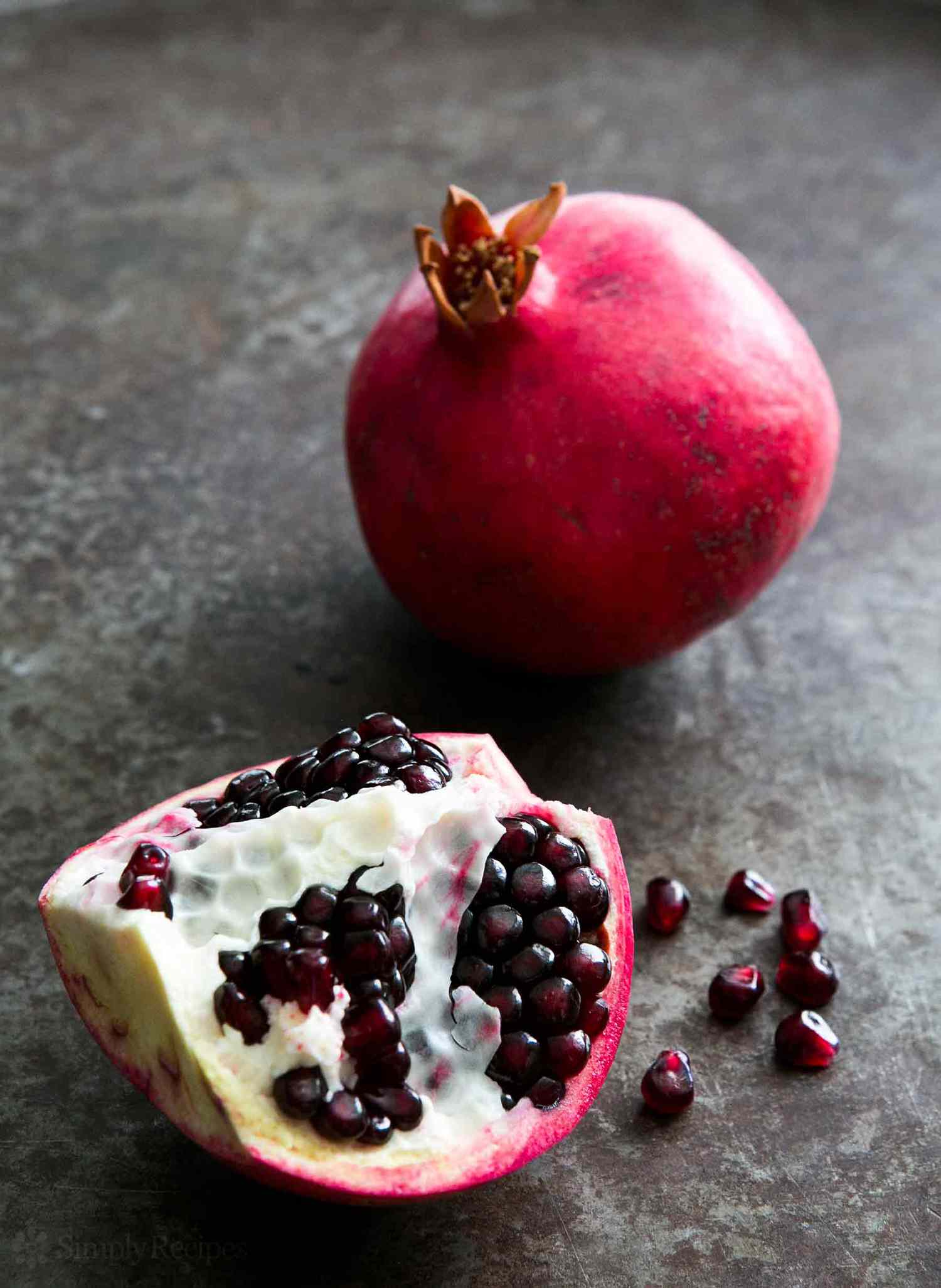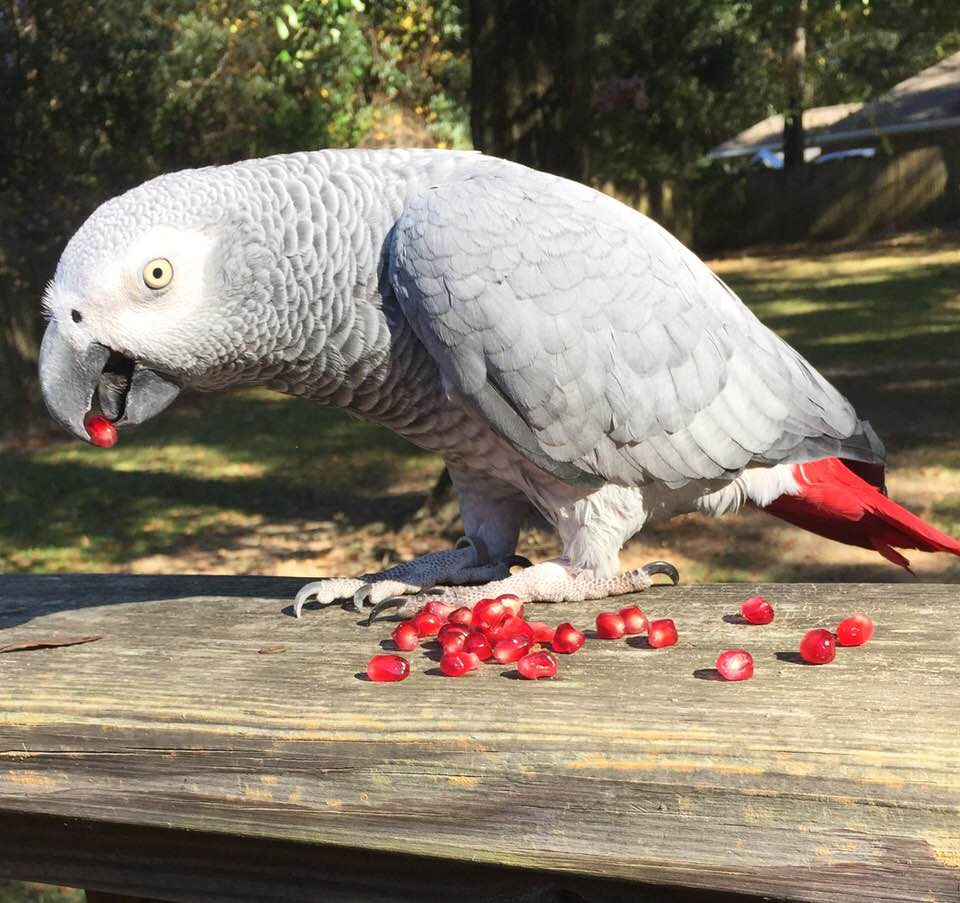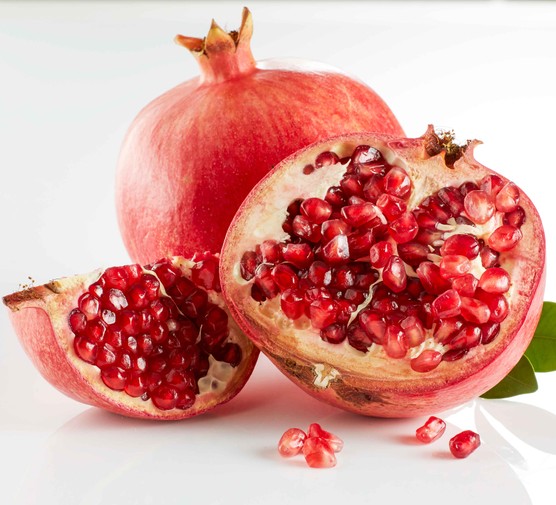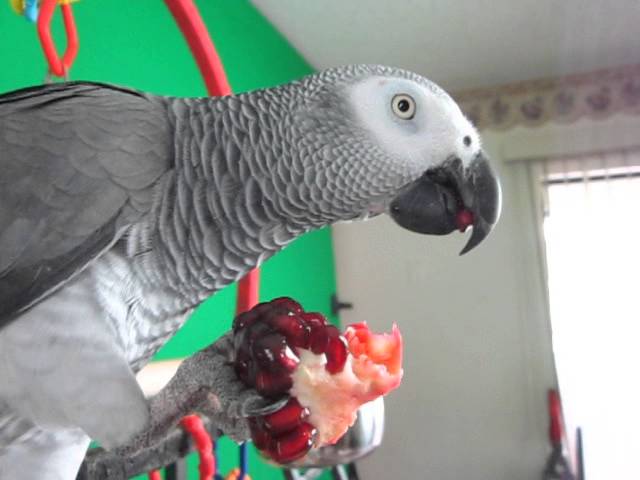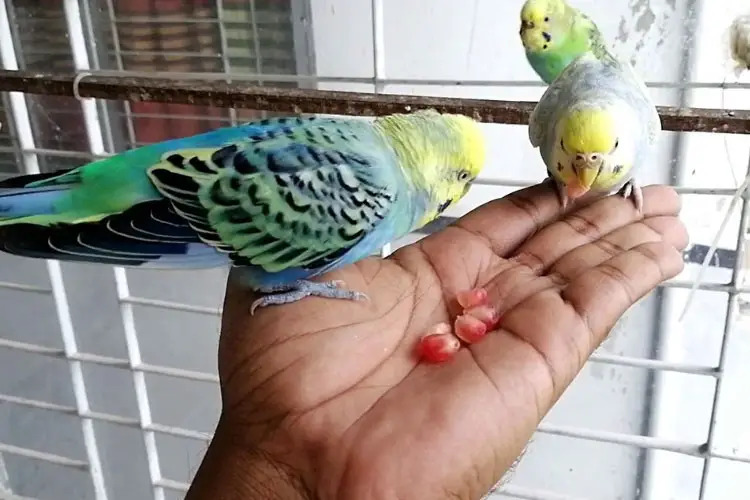Can Birds Eat Pomegranate? Feed Your Avian Friends With Love
Pomegranates are interesting fruits that provide health benefits. But can birds eat pomegranate? You may be wondering whether you can give your pet birds or wild birds that come to visit your yard pomegranate fruits or pomegranate seeds.
Author:Liam JonesReviewer:Maya ReyesOct 09, 2023949 Shares237.2K Views
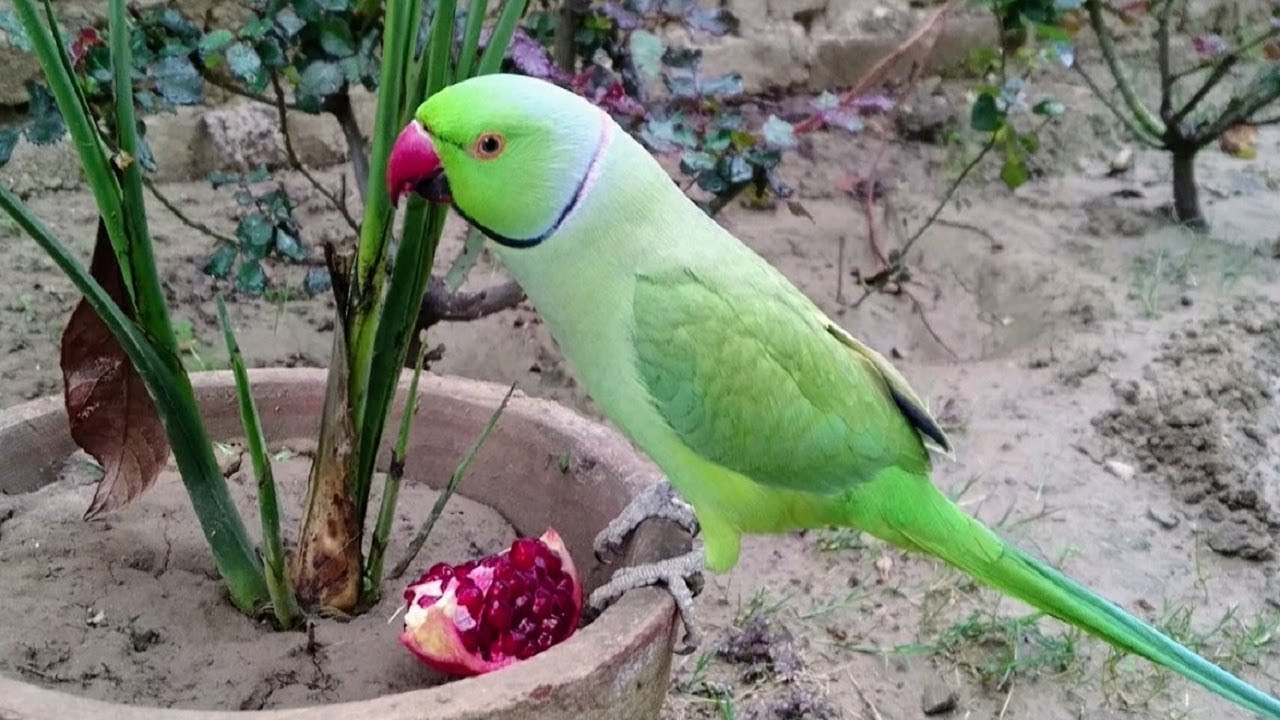
Pomegranates are interesting fruits that provide health benefits. But can birds eatpomegranate? You may be wondering whether you can give your pet birds or wild birds that come to visit your yard pomegranate fruits or pomegranate seeds.
The truth is that you certainly can. Birds eat these fruitsand their seeds from time to time in their native ranges.
Pomegranates may still be a much-loved and healthful supplement to a bird's diet even if they are not often found in the diets of native birds or the majority of birds maintained as pets.
Pomegranate - A Nutritional Powerhouse
Pomegranates can indeed be considered a nutritional powerhouse for birds, just as they are for humans. When offered to pet birds or observed by wild birds, pomegranates can provide a range of essential nutrients and health benefits. Here are some reasons why pomegranates can be a valuable addition to the diet of certain bird species:
- Vitamins -Pomegranates are a rich source of vitamins such as vitamin C, which is essential for the overall health of birds. Vitamin C supports the immune system and helps maintain healthy skin and feathers.
- Antioxidants -Pomegranates are loaded with antioxidants like polyphenols and flavonoids. These compounds can help protect birds' cells from oxidative damage, which can occur due to metabolic processes and environmental factors.
- Hydration -Pomegranates have high water content, which can help keep birds hydrated, especially in warmer weather when water sources may be scarce.
- Variety -Offering a variety of fruits, including pomegranates, can help maintain a balanced and interesting diet for pet birds, reducing the risk of dietary deficiencies.
- Stimulation -Providing whole or partially opened pomegranates to birds can stimulate their foraging instincts and mental engagement, as they work to extract the seeds.
- Natural Sugars -While pomegranates contain natural sugars, they can provide a source of energy for birds. However, it's essential to offer them in moderation to prevent excessive sugar intake.
- Digestive Health -The fiber in pomegranates can contribute to good digestive health in birds by promoting regular bowel movements.
How To Provide Pomegranates To Birds
Providing pomegranates to birds can be a delightful way to attract these colorful creatures to your garden while also offering them a nutritious treat. Here's a step-by-step guide on how to provide pomegranates to birds:
- Choose ripe pomegranates -Select ripe pomegranates from your local grocery store or harvest them from your garden if you have pomegranate trees. Ripe pomegranates should have a deep, rich color and feel heavy for their size.
- Prepare the pomegranates -Wash the pomegranates thoroughly to remove any dirt or pesticide residue. Cut them into halves or quarters. Birds will have an easier time accessing the seeds this way.
- Place them on a platform or feeder -Find a suitable bird feeder or platform to place the pomegranate halves or quarters. You can use a specialized fruit feeder or simply lay them on a flat surface like a wooden board, tree stump, or a tray designed for bird feeding. Make sure it's secure and stable.
- Secure the pomegranates -To prevent the pomegranates from rolling away or falling off the platform, you can use small nails, wooden skewers, or even natural twine to secure them in place. Make sure they are firmly attached but not too difficult for birds to access.
- Offer in a safe location -Place the pomegranates in a safe and easily accessible location for birds. Ideally, position the feeder near shrubs or trees where birds can perch and take shelter if needed. Avoid placing it too close to potential predator hiding spots like bushes or dense foliage.
- Monitor and refill -Keep an eye on the pomegranates and refill them as needed. Birds will peck at the seeds, and once they have eaten most of them, replace the pomegranates with fresh ones.
- Clean up as necessary -Over time, pomegranates may start to rot or attract unwanted pests. Remove any spoiled or moldy fruit promptly to maintain a healthy feeding environment for the birds.
- Enjoy the birdwatching -Sit back, relax, and enjoy watching the birds as they visit your pomegranate feeder. Different bird species may be attracted to the fruit, including cardinals, thrushes, orioles, and woodpeckers.
Are Pomegranates The Best Choice For You To Feed To Birds?
Purchasing pomegranates may not be the greatest choice if they don't grow locally where you live. Recall that another method to assist the birds and other species is to attempt to live as sustainably and environmentally friendly a lifestyle as you can. Do the right thing for the environment and people. Reduce food miles by purchasing seasonal, local vegetables.
Focusing on a range of food sources that can be produced organically, as locally as possible, or better yet, on your land, would be much preferable than importing exotic fruits from afar. The birds and other creatures will gain, and you and our world will all be healthier as a result. Think about cultivating local berry bushes and fruit trees that are appropriate for your location and garden. Producing fruit and berries is a far more sustainable and environmentally good method to feed yourself, neighborhood birds, and the environment.
Can Birds Eat Pomegranate?
Pomegranates are not native to the United States, thus they are not a natural food source for our country's wild native birds. However, if pomegranates are cultivated or left out in your garden, many birds will still eat them if they come upon this food source. When supplied as a part of their diet, pet birds will likewise eat this magnificent fruit and seem to enjoy doing so.
A fantastic source that parrots and other pet birds would like is pomegranates. The pomegranate (Punica granatum) is indigenous to the Himalayas, East Asia, and South-Eastern Europe. Due to its deep roots and acceptable drought resistance, it may be a productive food-producing tree in somewhat hot and dry places.
Nevertheless, it is often planted in warmer temperature parts of the United States and worldwide (USDA zones 8–12). Pomegranates are often planted as stand-alone trees, amid fruiting hedgerows, or in areas with lower water tables. Their thick roots also assist to hold the soil in place and stabilize banks or slopes.
Though not typically considered a useful food source for wild birds when growing in a garden, if you grow pomegranates where you live, you might find that backyard birdswill enjoy this tasty treat when you leave it out for them in a feeding area.
Can Parrots Eat Pomegranate?
Yes, parrots can eat pomegranate, and it can be a healthy addition to their diet when given in moderation. Pomegranates are rich in vitamins, minerals, and antioxidants, which can benefit a parrot's overall health. However, as with any fruit or treat, it's essential to offer pomegranate to your parrot in moderation because it is also relatively high in natural sugars.
Can Parakeets Eat Pomegranate?
Pomegranate seeds are one kind of seed that parakeet like eating. So, just remove the tough skin and white membranes if you want to treat your pet to a pomegranate. The remainder will be handled by the parrot by itself. The quantity of seeds is the sole factor you should consider. To prevent choking, avoid feeding your parrot too much at once.
Can Conures Eat Pomegranate?
Pomegranates are a food option for conures. When provided in moderation, the pomegranate may be a healthy supplement to a conure's diet. It offers antioxidants, vitamins, and minerals, all of which may improve their general health. To avoid consuming too much sugar, it should, like other fruits, be consumed in moderation.
Can Budgies Eat Pomegranate?
Although they might not possess nearly as much intellect as pigeons, budgies are also renowned for their intelligence. Since they have developed alongside humans for hundreds of years, budgies can generally eat almost everything that humans can. Pomegranates are included in this. Nothing prevents you from offering your budgie some seeds from your fruit dish or even some fresh juice.
Can Conures Eat Pomegranate Seeds?
Of course, if you are familiar with pomegranates, you will know that the fruit’s flesh contains many seeds. Are these seeds safe for conures to consume? The good news is that pomegranate seeds are perfectly safe for wild and pet birds to consume. Conures love eating seeds, so feel free to feed them pomegranate seeds.
The Birds Are Conservative
However, birds also need to eat. Consider what else they can eat besides the fruit from your trees. Plant half of what you like and half of what the birds like. In this manner, you may enjoy the fruit and the delight of watching content birds chow away. Offering hospitality makes you feel good within.
Large flocks of rosellas, parrots, and bower birds frequent this area, but they overlook our oranges in favor of the small, tart calamondins instead. Calamondins may be dragged away or retained in a claw and are very prolific. Of course, there are several different crops that may entice birds.
Look for local (sour) fruits that thrive where you live and use them to entice birds away from the unpleasant sweet things we like as humans. Particularly during dry periods, birds often consume fruit solely for moisture. Daily fresh water should be provided since 40% of fruit consumption involves seeking for water.
The ponds in our stream are constantly filled with water, but the birds prefer water that is nearby and will eat fruit rather than fly 200 meters for it. Placing birdbaths out of the cat's reach in a shaded area and maintaining a constant supply of cold, clean water in them. You could discover that bird damage has significantly decreased or stopped altogether. Additionally, you'll enjoy watching the drinking birds.
Encourage local birds as well, such as our goshawks, eagles, and strong owls, since they will aid in warding off seasonal intruders like white cockatoos. Particularly resident currawongs, magpies, and other big birds are affected by this. And choose often. Once birds sample a fruit, it will be quite challenging to persuade them to eat anything else. The birds won't be aware of the alluring treats in your garden if you gather ripe apricots, strawberries, cherries, raspberries, and other fruits and vegetables every day.
By picking often, pests like fruit flies and other creatures drawn to the aroma of ripe fruit such as scale and stink bugs will not be attracted. Daily harvests that are smaller are also simpler to manage. When I have the time, I put entire fruits in the freezer to stew or make jam or jelly. As you place each berry in bags or containers and freeze them one at a time, daily handfuls of berries quickly mount up.
Can Birds Eat Pomegranate? - FAQs
Can All Birds Eat Pomegranates?
Pomegranates can be enjoyed by many bird species, but not all birds will readily accept them. Different birds have different dietary preferences, so whether a bird will eat pomegranates depends on its species and individual taste.
Are Pomegranates Safe For Birds?
Pomegranates are generally safe for birds when offered in moderation. However, it's essential to remove any seeds, as they can be a choking hazard. Also, make sure the pomegranates are fresh and free from pesticides or contaminants.
How Should I Prepare Pomegranates For Birds?
To prepare pomegranates for birds, remove the seeds from the fruit's arils and the white pith. You can offer the arils and pith as separate items. Birds can enjoy them both.
Can Pomegranates Help Attract Birds To My Garden?
Pomegranates, along with other fruits, can be used to attract birds to your garden if they are native to your region and are known to feed on such fruits. Providing a bird-friendly habitat with suitable food sources, water, and shelter can attract a variety of bird species.
Conclusion
In conclusion, many bird species can safely enjoy pomegranates as a part of their diet. Pomegranates offer valuable nutrients and antioxidants, but they should be offered in moderation due to their natural sugar content. Proper preparation, which involves removing seeds and ensuring freshness, is essential. Birds have varying preferences, so individual reactions may differ.
For pet birds, pomegranates should be an occasional treat, with a primary diet consisting of pellets and vegetables. In gardens, pomegranates can attract wild birds if they are native to the area. Ultimately, pomegranates can be a nutritious and appealing addition to birds' diets when offered sensibly and as part of a diverse food selection.

Liam Jones
Author
Liam Jones has made it his mission to prove that adventure doesn’t need a hefty budget. Having traveled to over 40 countries, he specializes in finding affordable ways to experience the world, from the best street food in Bangkok to hidden gems in Lisbon.
Liam’s travel tips have reached thousands of readers, empowering them to see the world on a shoestring budget without sacrificing quality. With a deep passion for local cultures, he continues to share his travel hacks, ensuring adventure remains accessible to all.

Maya Reyes
Reviewer
Maya Reyes’s wanderlust was sparked in the temples of Luang Prabang, where the scent of lemongrass and the chants of monks revealed the transformative power of travel.
Since then, her journey has been defined by cultural immersion and authentic connections. From learning batik in Indonesia to sharing meals with nomadic families in Mongolia, Maya seeks experiences that highlight the human stories behind each destination.
Travel for her is a way to weave her narrative into the world’s cultural tapestry, creating bridges across diverse ways of life. Maya has traveled to 15 countries and shares her insights through writing and storytelling.
Latest Articles
Popular Articles
